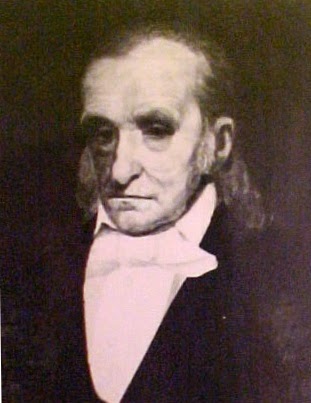 |
| Captain Daniel Hosbrook Commander at Ft. Amanda Feb. 28 - Aug. 2, 1813 |
Despite the patriotic fervor of the times, not everyone drafted to serve in the military was fit for service. In addition to physical health or mental conditions that exempted men from serving, individuals could also be exempted for personal objections to the war, certain occupations, finding a substitute and even poor dental hygiene.
Automatically exempted from duty were jail keepers,
judges of the Supreme and Common Pleas Courts of the State of Ohio, custom house officials and their clerks, post officers,
stagecoach drivers engaged in United States postal service and ferry-men employed at a ferry or post road.
Conscientious Objectors
In addition, clergy of all denominations were automatically exempted upon proof of occupation.
If an individual was a member of the “Society of Friends” (Quakers), Mennonites and Dunkers he was exempted as a conscientious objector however exemption wasn’t automatic. In Maryland for example, it became effective only after the individual paid a three dollar fee with the money used to cover the cost of a certificate that was issued explaining the reason for the exemption and for compensation for the services of the militia captain who had to complete the paperwork, etc.
Morally Unfit
In addition, a man could even be exempted if he was considered morally unfit for duty. I don't know how a man could be considered unfit unless he was known to be a drunkard or a considered a general menace to society. The number of drunkards at the beginning of the War of 1812 is quite astounding.
Note; In fact, in the early republic, Americans drank quantities we would consider astounding today. In 1790, we consumed an average of 5.8 gallons of absolute alcohol annually for each drinking-age individual. By 1830, that figure rose to 7.1 gallons!
Find a Sub
Another way a man could be exempted from service was if he could find someone to serve in his place, a substitute.
Those individuals could pay or otherwise compensate someone to serve in his place or as was often the case, a family member served for them. Re-enlisting or serving as a substitute was an excellent way to earn extra money, particularly single men without families to support.
No Front Teeth? Can't Use You.
If you had few, or better yet, no front teeth, you might be exempted from service. During the War of 1812, a rifle cartridge consisted of a paper tube filled with black powder and a lead ball.
Cartridge
To fire his musket, the man needed to be able to tear or bite off the end of the paper tube to pour the powder and ball down the barrel. With few or no teeth, the man might have a problem opening the paper tube which, in a battle situation could have put not only him but his comrades in a compromising situation.









